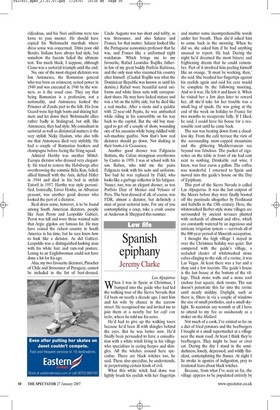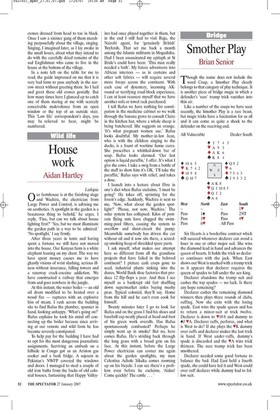Spanish epiphany
Jeremy Clarke Las Alpujan-as When I was in Spain at Christmas, I bumped into the guide who had led the walking tour of the Sierra Nevada that I'd been on nearly a decade ago. I met him and his wife by chance in the narrow street. He recognised me and invited me to join them at a nearby bar for café con leche, where he told me his news.
He'd had to give up the walking tours because he'd been ill with shingles behind the eyes. But he was better now. He'd finally been persuaded to have a consultation with a white witch living in his village who specialises in curing herpes and shingles. All the witches around here specialise. There are black witches too, he said. These also specialise, he understands, in perpetrating certain kinds of evil.
What this white witch had done was lightly brush his eyelids with her fingertips and mutter some incomprehensible words under her breath. Then she'd asked him to come back in the morning. When he did so, she asked him if he had anything unusual to report. He had. During the night he'd dreamed the most bizarre and frightening dream that he could remember. Part of it involved him peeling himself like an orange. 'It must be working, then,' she said. She brushed her fingertips against his eyelids again and said his cure would be complete by the following morning. And so it was. He felt it and knew it. When he visited her a few days later to reward her, all she'd take for her trouble was a small bag of spuds. He was going at the end of the week on holiday to France for two months to recuperate fully. If I liked, he said, I could have his house for a reasonable rent until he came back.
The sun was beating down from a cloudless sky. From the café terrace the view of the surrounding snow-capped mountains and the glittering Mediterranean sea beyond was fabulous. The packet of cigarettes on the table in front of me had cost next to nothing. Drinkable red wine, I knew, was four euros a gallon. The coffee was wonderful. I returned to Spain and moved into the guide's house on the Day of Epiphany.
This part of the Sierra Nevada is called Las Alpujarras. It was the last outpost of the Moors before they were finally booted off the peninsula altogether by Ferdinand and Isabella in the 15th century. Here, the whitewashed Berber-style stone villages are surrounded by ancient terraces planted with orchards of almond and olive, which are constantly watered by an ingenious and intricate irrigation system — survivals all of the 800-year period of Moorish occupation.
I thought the high village I stayed in over the Christmas holiday was quiet. But compared with the guide's village, a secluded cluster of whitewashed stone cubes clinging to the side of a ravine, it was Las Vegas. At least there was a bar and a shop and a few tourists. The guide's house is the last house at the bottom of the village. Thick stone walls and a stone roof enclose four square, dark rooms. The sun doesn't penetrate this far into the ravine until nearly midday. Daylight, such as there is, filters in via a couple of windows the size of small portholes, and a small skylight. To maintain any warmth at all I have to attend to my fire as assiduously as a stoker on the Mallard.
Not much of a cook, I've existed so far on a diet of fried potatoes and the beefburgers I bought at a small supermarket at a village near the main road. At least I think they're beefburgers. They might be boar or civet cat. During the day I stand in the semidarkness, lonely, depressed, and wildly flatulent, contemplating the flames. At night I lie awake in agonies of indigestion, prey to irrational fears about black witches.
Because, from what I've seen so far, the village appears to be populated entirely by crones dressed from head to toe in black. Once I saw a sinister gang of them marching purposefully about the village, singing. Singing, I imagined later, as I lay awake in the small hours, about what they intend to do with the carefully dried remains of the sad Englishman who came to live in the house at the bottom of the village.
In a note left on the table for me to read, the guide impressed on me that it is very bad form to pass anybody in the narrow street without greeting them. So I hail and greet these old crones genially. But how many times have I glanced up to catch one of them staring at me with scarcely conceivable malevolence from an open window or the top of an outside stair. This 'Low life' correspondent's days, you may be relieved to hear, might be numbered.















































 Previous page
Previous page